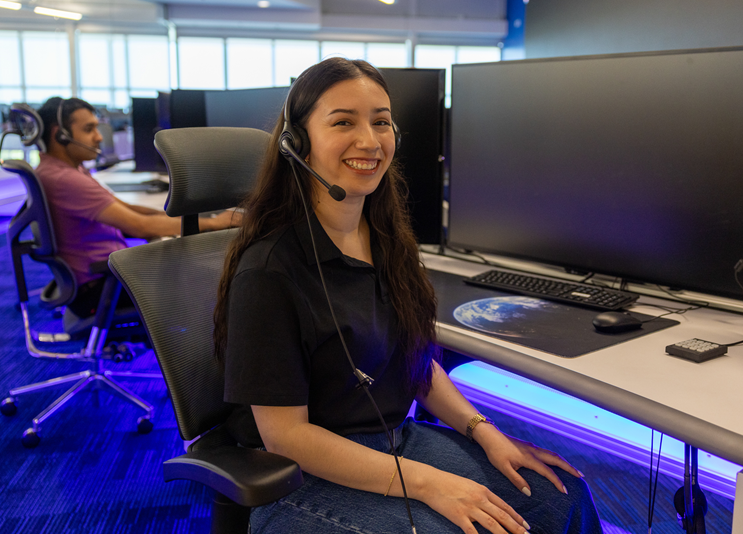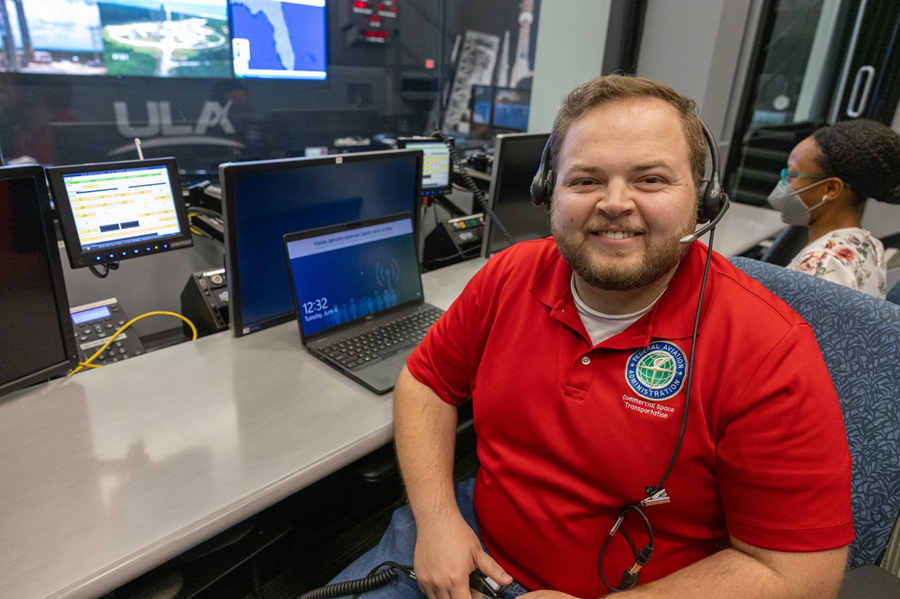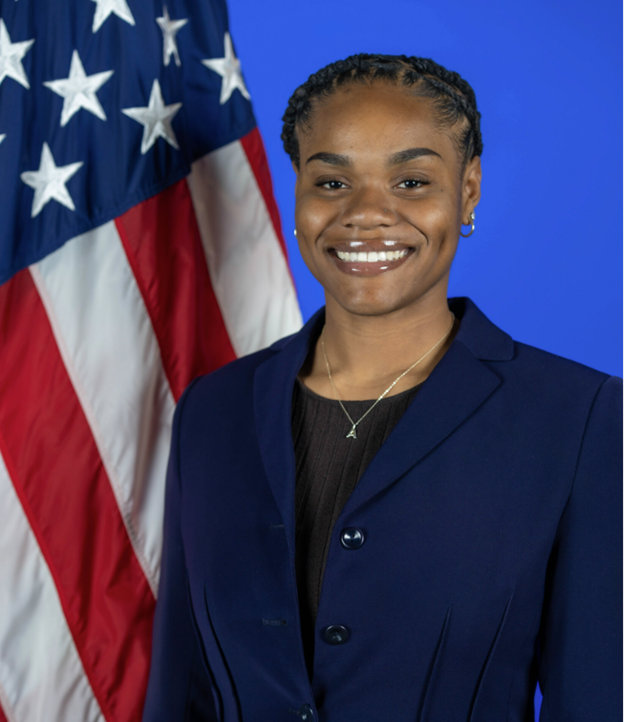Elevating Safety for Rocket Launches and Reentries

It was a crystal-clear afternoon on the central coast of California. The day was March 4, 2024. Randi Arteaga was positioned in the control center at Vandenberg Space Force Base, going through her safety checklist and listening closely on her headset to the countdown communications for the SpaceX Falcon 9 rocket launch.
Arteaga looked out the window to her right and saw the rocket lifting off. She could feel the booms and intense power of the vehicle. It was her first time “on console” for a rocket launch. Based in the Los Angeles area, Arteaga is one of 25 FAA safety inspectors who oversee FAA-licensed space operations at federal and private launch sites across the United States and in foreign countries.
She and her colleagues ensure every commercial space launch complies with all FAA safety regulations. That means protecting people in the air – aboard planes and other aircraft – at sea and on the ground.
“That’s really the be-all, end-all of what we do – making sure the public is safe,” Arteaga said. “That is our ultimate, number one goal. That’s why we’re here.”
Safety First
The FAA's Office of Commercial Space Transportation enables safe space transportation by protecting the public, property, and national security of the United States during commercial space launches and reentires.
In 41 years of regulation and more than 1,000 FAA-licensed space operations, the agency’s Office of Commercial Space Transportation has a perfect public safety record in overseeing launches and reentries by private companies, individuals and state agencies – meaning no injuries or fatalities to the public have occurred during a commercial space operation.
“We’ve met our mission on every flight, and we’re proud of that,” said Marcus Ward, an FAA supervisor who oversees commercial space safety inspectors.
The FAA also helps foreign partners develop safety standards for launch and reentry operations.
“We as international regulators have a duty to set common guidelines to help the industry succeed,” Ward added. “We’ve done this in aviation, and it’s our opportunity to lead this effort in space as well.”
FAA commercial space safety inspectors oversee rocket launches and reentries, ensuring FAA-licensed operators adhere to the parameters of their license. “For example, a rocket has a set trajectory,” Arteaga said. “It shouldn’t be flying over densely populated areas, so we make sure it’s flying the path it should be flying, that nothing is occurring that could jeopardize public safety.”
They also ensure the flight termination systems on space vehicles are working properly so the automated system will destroy or disable the vehicle if it veers off course or malfunctions. Additionally, they coordinate with the FAA’s Air Traffic Control System Command Center to ensure planes and other aircraft are out of harm’s way.
“Our job isn’t to make sure the rocket doesn’t have a mishap but instead to make sure if there is a mishap that no one in the public gets hurt,” said Collin Anderson, a Florida-based commercial space safety inspector who has worked more than 60 launches on console.
Meeting the Need of the Rapidly Growing Space Industry
The number of FAA-licensed commercial space launches and reentries has grown by more than 900 percent in the last decade. This year the FAA has overseen 190 operations, averaging about four licensed operations per week. The agency reached 1,000 licensed operations in August and expects to reach 2,000 within the next five years.
This forecast spurred the FAA to launch an Aerospace Rulemaking Committee to look at how to optimize the operations licensing regulations to improve clarity and efficiency. The FAA’s space office needs more safety inspectors immersed in an industry that is growing fast.
“We’ll probably have around 200 operations (this includes launches and reentries) this year,” said Ward. “So, we really need bright minds and trailblazers coming straight out of college to help us. Eventually we are going to Mars, and we need this upcoming workforce to help us get there.”
An Engaging Career

Collin Anderson got the aviation bug watching military tankers fly in and out of the Air Force base near his hometown in Florida. That led him to Embry-Riddle Aeronautical University, where he turned his attention to space as rockets launched not far to the south at Cape Canaveral. Now he works right by the Cape, where nearly half of all licensed U.S. space launches have occurred.
“Space is infinite; it’s ever-expanding,” Anderson said. “It’s an awesome job. I’ve worked at least four first flights on console in five years, and I don’t know anyone who can say that outside of the FAA.”
Anderson worked a launch in Kodiak, Alaska, and he was on console for Blue Origin’s crewed space launch from Launch Site One in Van Horn, Texas, on July 20, 2021. That mission carried four people, including legendary aviator Wally Funk – the FAA’s first woman flight inspector – and Amazon founder Jeff Bezos, into space. The excitement is palpable for newer safety inspectors, too. A year in, Aaliyah Jones has already worked as the lead duty officer for a crewed launch. Jones oversaw critical communication between the team onsite and other FAA partners for the launch of Blue Origin’s New Shepherd vehicle at Launch Site One on Nov. 22, 2024. The vehicle carried six people on a suborbital mission, including author and TV host Emily Calandrelli, widely known on the Internet as the “Space Gal,” who became the 100th woman to go to space.

“It was really cool to have a role in something that big, a piece of history being made,” Jones said shortly after the launch. “It was really rewarding to be part of that.”
Jones graduated from Alabama’s Tuskegee University with a degree in aerospace engineering. “I knew about job openings in air traffic control, but I did not know about this opportunity in space. This is a great fit.”
While most of the FAA’s space transportation safety inspectors have backgrounds in engineering, students and professionals in other disciplines with a passion for space could find this career to be the perfect fit, too.
“We have a robust training program in place to certify our inspectors and prepare them for working launches and reentries,” Ward said. “If you love space, this is the place for you.”
